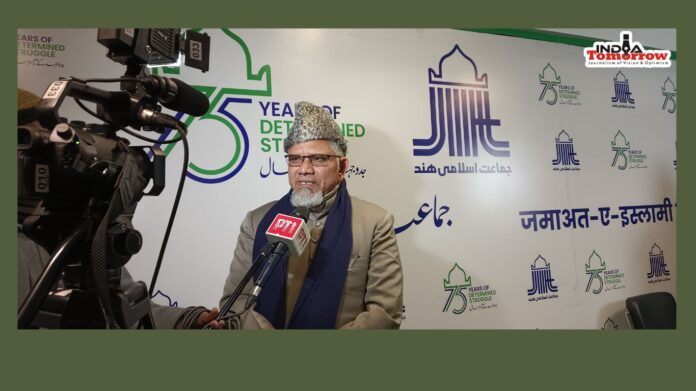India Tomorrow
BENGALURU–Ahead of the upcoming Lok Sabha elections, Jamaat-e-Islami Hind (JIH) Vice President Professor Mohammad Salim Engineer has called for countering the politically motivated misuse of religion for division and exclusion, urging a focus on real issues like the economy, unemployment and social justice.
Presiding over a round table discussion on the 2024 Lok Sabha polls organised by the Forum for Democracy and Communal Amity-Karnataka Chapter (FDCA-K) here recently, Prof. Salim highlighted the success of Karnataka’s experiment of defeating communal and divisive politics in assembly elections as a model for the rest of the country. Criticizing the tendency to create a false enemy and promote fear among people, he called it a fascist tactic. He suggested that citizens need to be educated to vote without bias for society’s betterment, realising how religion is cynically used by some to grab power.
Recalling India’s freedom struggle against the British, he pointed out, “our enemies today are mostly misguided people from within, not outsiders.” He termed the cultural nationalism laced with religion as fascist in nature, based on lies, false enemies and divisiveness and aimed at creating unfounded fears. But these are weak foundations that can be countered, he underlined.
The most immediate issue is the 2024 Parliamentary polls, Prof Saleem stressed, adding that civil society groups should increase outreach and educate citizens to replicate Karnataka’s example of defeating fascist forces at the national level. He advocated for educating voters to cast unbiased ballots for the betterment of society, recognizing how religion is cynically exploited by some to grab power.
Sarcastically targeting the present Union Government, senior journalist Shivsundar pointed out five impacts on Constitutional values, including the ‘Adani’isation of the economy, ‘Modi’-fication of politics, ‘Arnab’isation of media, ‘Ayodhya’fication of the judiciary, and ‘Ram’-ification of the Rashtra. He emphasized the need to engage youth in rational discussions about the real issues facing the country.
Speaking at the event, Trilochan Sastry, Founder-Trustee of the Association for Democratic Reforms, suggested that Muslim leaders could help counter the victimhood narrative among Hindus by making bold statements expressing respect for Hindus and distancing themselves from showing any interest in conversion.
PUCL-Karnataka President Arvind Narrain described January 22 as a day of pain and disappointment after the Supreme Court’s biased Ayodhya verdict. He said the sedition law has been weaponised to target dissent against the government, while India is shifting from ‘Constitutional Raj’ to ‘Rama Raj’.
Highlighting the meagre representation of women in assemblies and Parliament, Ms. Brinda Adige of Global Concerns India, said, “Though women’s participation in electoral politics today is nearly 15%, it is merely used as the “token face” by selecting women as proxies of men wielding political power under the quota system. Ms. Adige pointed out that when women do get the chance to exert their power and play their roles, especially under the Women’s Reservation Act of 2023, they would effectively and efficiently fulfill their responsibilities, focusing on education and health.
JIH Karnataka President Dr. Mohammad Saad Belgami called for a mass movement to establish ‘dharma’ marked by empathy, courage, commitment, concern, and sacrifice over the coming decades.”
IPS-officer-turned-activist M.F. Pasha said the government does not consult minorities while making laws affecting them. He said the Constitutional ideals of equality, brotherhood and amity face challenges that need to be countered.
FDCA-K released 20 points People’s Manifesto for Lok Sabha polls 2024
On this occasion, a 20-point People’s Manifesto was released with demands for inclusive politics, social justice, impartial functioning of Constitutional bodies like the ED, ECI and CBI, checks against majoritarianism, mob violence and cow vigilantes, women’s rights, jobs and fairness for marginalised sections. FDCA-K has requested all political parties aspiring for power to consider these 20 recommendations and incorporate them into their manifestoes for the upcoming Lok Sabha elections.
The manifesto urges universal application of laws free from bias, scrupulous adherence to parliamentary rules and Constitutional diktats, and sensitizing police and security agencies to protect citizens’ lives and dignity. It also emphasizes protecting places of worship, denouncing hate speech, ensuring fair representation for marginalized groups, and prioritizing job creation.
Political parties have been urged to adopt inner-party democracy, avoid giving tickets to individuals with criminal records, and commit to free and fair electoral practices. Transparency is crucial, with candidates’ affidavits and party finances being publicly disclosed. The manifesto also calls for a commitment to reduce the influence of money power in elections and outlines ways to achieve this goal.






Prof. Salim’s call to counter the misuse of religion for division and exclusion while focusing on real issues is a refreshing perspective in today’s political landscape ️. It’s crucial that we prioritize meaningful discussions and address the genuine concerns of our society to ensure a better future for all citizens . Let’s embrace unity and inclusivity as we navigate the complexities of our democracy . #ReligiousUnity #RealIssues #LokSabhaPolls
Can I get the manifesto copy? If yes, please email to [email protected]